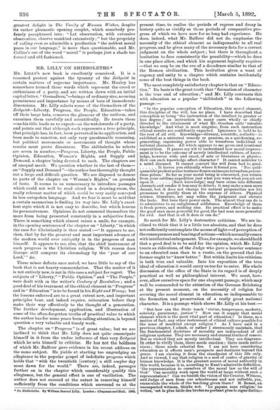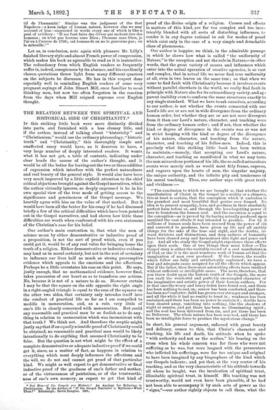MR. LILLY ON SHIBBOLETHS.*
Ma. LILLY'S new book is excellently conceived. It is a reasoned protest against the tyranny of the Zeitgeist in certain matters of supreme importance. Mr. Huxley has somewhere termed those words which represent the creed or enthusiasm of a party, and are written down with an initial capital letter, " Grenadiers,"—beings of ordinary size, securing prominence and importance by means of hats of immoderate dimensions. Mr. Lilly selects some of the Grenadiers of the Zeitgeist—Liberty, Progress, the People, Education—takes off their large hats, removes the glamour of the uniform, and examines them carefully and scientifically. He treats them —as his title leads us to expect—as the watchwords of a party, and points out that although each represents a true principle, that principle has, in fact, been perverted in its application, and been made to sanction, not only very questionable reasoning, but political movements or movements of thought whose results must prove disastrous. The shibboleths he selects are seven in number,—Progress, Liberty, the People, Public Opinion, Education, Woman's Rights, and Supply and Demand, a chapter being devoted to each. The chapters are of unequal merit. We question whether in the last of them— on " Supply and Demand "—the author has thoroughly thought out a large and difficult question. We are disposed to demur to parts of the chapter on "Woman's Rights," on grounds of taste. It seems to us unnecessary to introduce passages which could not well be read aloud in a drawing-room, the really relevant matter of which could be very easily conveyed in less outspoken language. And we fear it must be said that a certain mannerism is finding its way into Mr. Lilly's excel- lent style which it is not easy to describe, but which lessens its persuasiveness. Opinions do not commend themselves the more from being presented constantly in a subjective form. There is something which almost raises a smile, for example, in the opening sentences of the chapter on " Liberty," in which the case for Christianity is thus stated :—" It appears to me, then, that by far the greatest and most important advance of the modern world over antiquity is in the progress of man himself. It appears to me, also, that the chief instrument of such progress is the Christian religion. With reason does Europe still compute its chronology by the ' year of our Lord,' " &e.
These minor defects once noted, we have little to say of the book that is not hearty commendation. That the matter of it is not entirely new, is not in this case a subject for regret. The subjects of " Liberty," " Public Opinion," and " The People," were dealt with in the writer's Century of Revolution ; and a good deal of his treatment of the ethical element in "Progress" and in " Education " is to be found in his Right and Wrong; but the lessons enforced are to a great extent new, and important principles bear, and indeed require, reiteration before they make their way effectively to the thought of a generation. The further development, application, and illustration of some of the often-forgotten truths of practical valve to which the author has for some years been calling attention, is beyond question a very valuable and timely work.
The chapter on " Progress " is of great value; but we are inclined to think that Mr. Lilly does not quite emancipate himself in it from the undue influence of that very Zeitgeist which he sets himself to criticise. He has not the boldness of which Mr. Balfour gave evidence in his recent address on the same subject. He yields at starting too ungrudging an allegiance to the popular gospel of indefinite progress which holds that " with the twentieth [century] a still ampler day must dawn for the world." There are, indeed, passages further on in the chapter which considerably qualify this allegiance, but the general effect is one of vacillation. The author does not succeed at the outset in removing himself sufficiently from the conditions which surround us at the * On Shibboleths. By William Samuel Lilly. London: Chapman and Hall. 1892.
present time, to realise the periods of regress and decay in history quite as vividly as those periods of comparative pro- gress of which we have now for so long had experience. He does, indeed, what Mr. Balfour did not do, emphasise the- necessity of the ethical element as indispensable to all real' progress, and he gives many of the necessary data for a correct judgment on the whole subject ; but there is throughout a. hesitation to face consistently the possibility—which he does in one place allow, and which his argument logically requires- -that we may be on the eve of a decadence similar to that of the Roman civilisation. This hesitation gives a want of cogency and unity to a chapter which contains incidentally some of the best things in the book.
The most completely satisfactory chapter is that on " Educa.- tion." Its basis is the great truth that "formation of character is the true end of education ;" and Mr. Lilly contrasts this with education as a popular " shibboleth " in the following passage :—
" In the popular conception of Education, this moral element, this discipline of the will, has no place. I have described that conception as being `the instruction of the intellect in greater or less degree e an instruction in many cases wholly or chiefly directed to the attainment of what Mr. Goschen calls saleable knowledge.' And what is most singular, from such instruction ethical results are confidently expected. Ignorance is held to be the root of all evil. Knowledge—literary, scientific, teathetic—is exhibited as a universal remedy or panacea, as a quickening, re- generating, organising power able to transform individual or national character. All which appears to me gross and irrational superstition. It passes my wit to understand how moral improve- ment is to be the outcome of merely intellectual culture, of know- ledge, however wide and exact, of arts or literature or physica. How can such knowledge affect character ? It cannot minister to a mind diseased. It cannot convert the will from bad to good..
It leaves you ethically where it found you. 'Nee quid- quam tibi prodest aerias tentasse domes animoque rotundum percur- risse polum.' So far as your moral being is concerned, you return from your sublime expedition just what you were when you set out.
upon it [Such knowledge] may turn crime into different channels and render it less easy to detect; it may make a man more
but it does not change his natural propensities nor his proneness to gratify them at the expense of others. Physical science, literature, art may refine the judgment and elevate the taste. But here their power ends. The utmost they can do in to administer to an enlightened selfishness. Knowledge of theta is fresh power, and nothing else. Its practical effect is to make- the good man more powerful for good, the bad man more powerful for evil. And that is all it does or can do."
So much for Mr. Lilly's destructive criticism. We are in- clined to think that it is a little too absolute, and that he does not sufficiently contemplate the access of light—of perception of the consequences and bearing of actions—which normally comes- with intellectual enlargement. Thus, for example, we should hold that a good deal is to be said for the opinion, which Mr. Lilly treats as ridiculous, of the Judge who gave a heavier sentence- to an educated man than to a rustic, on the ground that the former ought to " know better." But within limits his criticism is both true and valuable. Into his exposition of the true ideal of education it would carry us too far to enter. His whole discussion of the office of the State in its regard is of deeply- practical as well as philosophical interest. We must, how-
ever, allow ourselves space for one eloquent passage, which may well be commended to the attention of the German Reichstag- at the present moment, on the necessity of religion for securing the moral element in education, so indispensable to, the formation and preservation of a really great national character. It is a passage which shows Mr. Lilly at his best :— " But how can the State teach virtue, temperance, modesty,. sobriety, parsimony, justice ' ? How can it supply that morals element which is the most vital part of education Is there, as a. matter of fact, any other instrument of ethical culture possible for the mass of mankind except religion ? As I have said in a, previous chapter, I admit, or rather I strenuously maintain, that the fundamental doctrines of morality are independent of all religious systems. They are necessary and eternal truths of reason. But so viewed they are merely intellectual. They are diagrams._ In order to vivify them, there needs emotion ; there needs enthu- siasm ; there needs celestial fire. I am not here considering education as it affects men's prospects and destinies beyond the grave. I am viewing it from the standpoint of this life only. And so viewed, I say that religion is a sort of centre of gravity of human knowledge. It is the greatest source of moral authority in this world, because it is, according to Kant's admirable definition, ' the representation to ourselves of the moral law as the will of God.' Can morality work upon the world at large without such a representation ? Can we banish the vision of the Creator, Witness, and Judge of men from our schoolrooms and not enfeeble, yes, emasculate the whole of the teaching given there? M. Henan, an unsuspected witness, thinks not. Le paysan sans religion,' he writes, ` est la plus laide des brutes ne portant plus le Fugue distinc-- tif de l'humanite.' Similar was the judgment of the first Napoleon—a keen judge of human nature, however else we may account of him—expressed in words every one of which is like a peal of artillery : '.11 me faut faire des eleves qui sachent etre des hommes ; on n'est pas homme sans Dieu ; l'homme sans Dieu, je l'ai vu e rceuvre de 1793 ; cet homme le. on ne le gouverne pas ; on le mitraille.' "
Let us, in conclusion, note again with pleasure Mr. Lilly's
finished literary style and almost French power of compression, which makes his book as agreeable to read as it is instructive.
The redundancy from which English readers so frequently suffer is, indeed, conspicuous by its absence, and his excellently chosen quotations throw light from many different quarters on the subjects he discusses. He has in this respect done especially well in reminding English readers of some very pregnant sayings of John Stuart Mill, once familiar to most thinking men, but now too often forgotten in the reaction from the days when Mill reigned supreme over English thought.



































 Previous page
Previous page